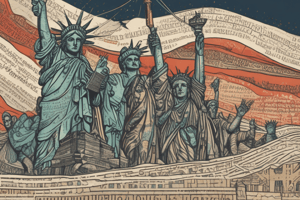Podcast
Questions and Answers
What is the primary purpose of fundamental rights?
What is the primary purpose of fundamental rights?
- To establish a moral code
- To protect the rights of others
- To ensure national security
- To promote social justice and equality (correct)
Which of the following is a characteristic of fundamental rights?
Which of the following is a characteristic of fundamental rights?
- Inalienability and divisibility
- Indivisibility and arbitrarity
- Universality and selectivity
- Universality and inalienability (correct)
What is the primary difference between civil and political rights and economic, social, and cultural rights?
What is the primary difference between civil and political rights and economic, social, and cultural rights?
- One focuses on negative rights, while the other focuses on positive rights
- One focuses on rights related to governance, while the other focuses on rights related to livelihood (correct)
- One focuses on universal rights, while the other focuses on selective rights
- One focuses on individual freedoms, while the other focuses on collective rights
Under what circumstances may fundamental rights be limited or restricted?
Under what circumstances may fundamental rights be limited or restricted?
What is the role of collective rights in the context of fundamental rights?
What is the role of collective rights in the context of fundamental rights?
What is a necessary requirement for any limitations or restrictions on fundamental rights?
What is a necessary requirement for any limitations or restrictions on fundamental rights?
What is the primary purpose of the freedom of speech, as outlined in Article 19?
What is the primary purpose of the freedom of speech, as outlined in Article 19?
Which of the following is a protected class under the Equality Before Law provision in Article 14?
Which of the following is a protected class under the Equality Before Law provision in Article 14?
What is the primary protection guaranteed under the Protection of Life and Personal Liberty provision in Article 21?
What is the primary protection guaranteed under the Protection of Life and Personal Liberty provision in Article 21?
What is prohibited under the Protection Against Exploitation provisions in Articles 23-24?
What is prohibited under the Protection Against Exploitation provisions in Articles 23-24?
What is the primary purpose of the Cultural and Educational Rights provisions in Articles 29-30?
What is the primary purpose of the Cultural and Educational Rights provisions in Articles 29-30?
What is the relationship between the Directive Principles of State Policy and the fundamental rights?
What is the relationship between the Directive Principles of State Policy and the fundamental rights?
Flashcards are hidden until you start studying
Study Notes
Definition and Overview
- Fundamental rights are a set of basic rights that are essential for human dignity and well-being.
- They are inherent and inalienable, meaning they cannot be taken away or denied.
- Fundamental rights are often enshrined in a country's constitution or bill of rights.
Characteristics
- Universality: fundamental rights apply to all individuals, regardless of their race, gender, religion, or nationality.
- Inalienability: fundamental rights cannot be taken away or surrendered.
- Indivisibility: fundamental rights are interconnected and inseparable.
- Interdependence: fundamental rights are interrelated and dependent on each other.
Types of Fundamental Rights
- Civil and Political Rights:
- Right to life and liberty
- Right to freedom of speech and expression
- Right to freedom of assembly and association
- Right to equality before the law
- Economic, Social, and Cultural Rights:
- Right to education
- Right to health
- Right to decent standard of living
- Right to social security
- Collective Rights:
- Right to self-determination
- Right to cultural identity
- Right to participate in cultural life
Importance of Fundamental Rights
- Protect human dignity and well-being
- Promote social justice and equality
- Ensure democratic participation and accountability
- Provide a basis for legal recourse and protection
- Foster a culture of respect and tolerance
Limitations and Restrictions
- Fundamental rights may be limited or restricted in certain circumstances, such as:
- National security
- Public order
- Morality
- Protection of rights of others
- Any limitations or restrictions must be:
- Provided by law
- Necessary and proportionate
- Non-discriminatory and non-arbitrary
Studying That Suits You
Use AI to generate personalized quizzes and flashcards to suit your learning preferences.



